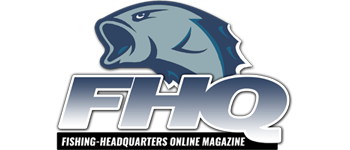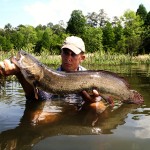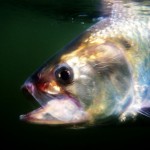This spring I purchased my dream boat, a 2011 Lund Pro V 1975 with a 225 horsepower Mercury Verado. Picking the boat and motor was easy where the work began was rigging the boat to fit my needs.
When rigging a boat the most important thing is to rig your boat to fit your style of fishing. If you only fish rivers, your boat will be rigged much different then someone who only fishes inland lakes. Someone who only fishes the great lakes will rig there boat differently from the person who fishes inland lakes and rivers. Because I fish walleye tournaments on rivers, in-land lakes, reservoirs and the great lakes I have to be versatile and be ready for totally different presentations.
Here is how and why I rigged my new Lund Pro V:
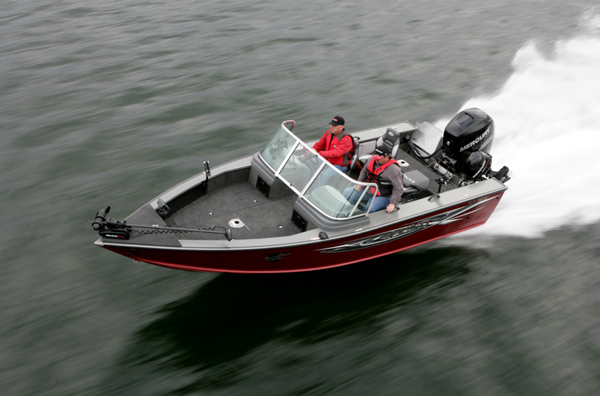
Electronics
This is probably the most important and most expensive decision you will make when rigging your boat. The advancement of technology in the last ten years has been unbelievable. These aren’t your dad’s depth finders or flashers. A grey scale Lowrance unit that I bought in 2002 looks as out of date as a black and white tube television. Today’s units have GPS, map overlay, side-imaging, down-imaging, mapping etc.
I chose to go with a top of the line Humminbird 1198C for the dash and a 998C for the bow unit. Lowrance also makes an excellent product with similar features and benefits. These units allow me to search for fish at speeds up to 20 miles and hour, which is extremely important especially on the great lakes.
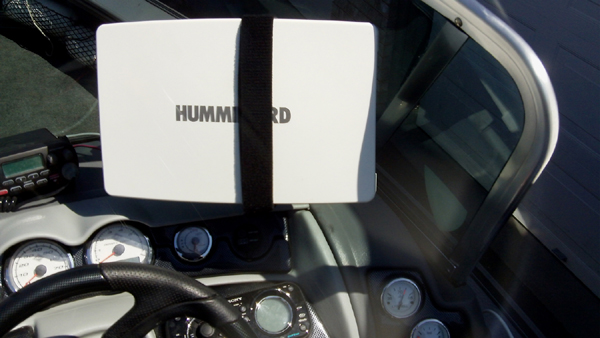
The GPS and map overlay data allow me to stay on the fish I found with military precision. The new side imaging gives the best detail, of what is going on below the boat, we have ever seen. The side imaging allows you to see structure and fish up to 200 feet to each side of the boat.
Another great feature is you can hook your locator up to your computer and use the lake maps to scout the body of water and even place waypoints on areas that look promising. There are many other features that are extremely helpful. The benefit of all of these features, if used correctly, is you will catch more fish!
The good news is you don’t need to have the top of the line locators. Humminbird, Lowrance and others make affordable units that fit your fishing needs. I recommend that you do get the gps and overlay mapping (many come with these) if nothing else for safety. Finding your way back to the boat landing or around wing dams in a fog or rain storm can be close to impossible. I have been saved many times by the gps and will not own a boat without one.
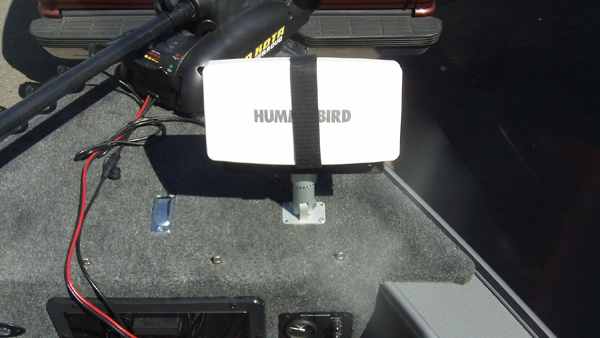
Mounting
If you are going to spend $4000, or more, on electronics make sure to buy a mount(s) that will support and protect your locator. I made the mistake of not using the proper mount on my last boat. I had a Lowrance 110C that would sometimes slip while traveling. On several occasions I was traveling over 50 miles an hour and the unit would slip, hitting the steering wheel. I would have to take one hand off of the wheel and push the unit upward often hitting the windshield. I easily could have damaged the locator and, even worse, put my safety at risk.
I chose Stabil mounts for both of my units. They are more expensive but the extra cost is worth it as my locators are safe and secure!
Mounting the transducer on the transom is extremely important. If it is too low the transducer is at risk of hitting something and breaking or flipping up at high speeds causing inaccurate readings. If you mount it too high inaccurate readings are likely. If you have side imaging you have to be careful that the side view is not obstructed. If you do it yourself read the directions carefully. I chose to have my dealer, Pharo Marine, do mine. For the bow I chose to buy a trolling motor that has the transducer mounted in the unit. If you choose this route, side or down imaging features cannot be used.
Trolling Motor
If you are a river fisherman and primarily jig a cable steer trolling motor is the way to go. The cable steering reacts immediately allowing you to keep your jig vertical. This is of utmost importance when fishing current breaks and eddies.
The most versitle bow mount trolling motors are the wireless units. These units can be steered remotely or they can be put on autopilot using a gps to stay on track adjusting for waves, wind and current. You can also record a track up to 2 miles long and can be used to immediately retrace your path. You can also save this path for a future trip. Some even have an anchor feature which allows you to stay on a spot without having to use an actual anchor.
I chose the Minn Kota 101 I-Pilot. For jigging it is adequate. If fishing an area where the current is constant it is great as you can set the autopilot to match the speed needed to keep your jig vertical. Where this trolling motor excels is when trolling or rigging. When trolling in rivers I use my kicker motor for power and use the remote to steer my boat. This allows me to fish with two hands free allowing me to move around the boat as needed. This is also great for netting fish.
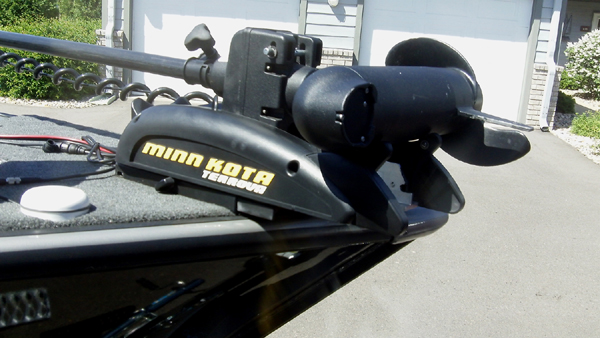
When fishing lakes I will use the I-Pilot to troll spinners. This is great when fishing shallow or when the walleyes are high in the water column allowing for a stealth approach.
Regardless of which trolling motor you buy do yourself a favor and buy the quick release plate, which is about $50. I had a trolling motor deploy at 30 miles an hour and I did not have the quick release plate. The shaft was made of graphite and splintered which meant I could not slide it back up to a secure position. I had to slowly motor over to shore and take off the trolling motor in 30 degree temperatures. You won’t have that problem with the quick release bracket!
On-Board Charger
If you have ever gone to a boat landing and tried to tilt your motor up only to find out you have a dead better then you know the importance of an on-board charger. I chose the ProMariner 4 bank charger. Three of the leads are hooked up to the trolling motor batteries and one to the starting battery. This charger is pre-rigged, waterproof and charges batteries quickly. Just plug in your charger after a long day of fishing and you will be sure to have fully charged batteries in the morning.
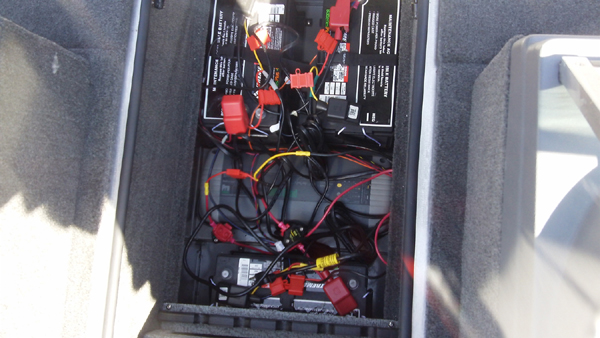
Rod Holders
Lund has a neat feature that allows you to mount your rod holders using their sport track system. This allows you to move the rod holders as needed, just slide it along the track.
I mounted Scotty rod holders to the sport track brackets. I also use rod holder extensions, which allow me to spread my lines out with fewer tangles. Wisconsin allows three rods per person when trolling. I have three rod holders on each side in the back of the boat and one on each side in the front. If you use planer boards I recommend that you have one more rod holder on each side than you do rods. The great thing about the sport track system is you can remove and store them easily.
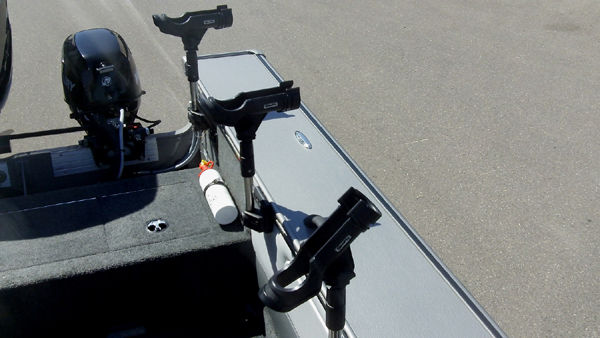
Gauges
If you are buying a new boat or if you want to upgrade your existing boat, I highly recommend getting the smart gauges. With my Mercury Verado I can turn down the rpm’s slow enough to troll. With a push of the button I can see how much gas I have left, how many hours on my motor, trim height, optimal rpm’s for fuel consumption and how much gas I am burning per hour just to name a few.
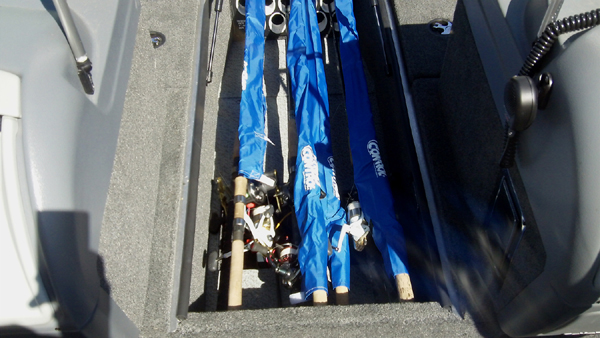
Access
If you own a boat 17’ or larger you know how tough it is to get in and out of your boat. Some step on the spare tire others step on the wheel wells of the trailer. Both can be dangerous especially if moisture is involved. Launching and loading your boat is also a chore as there is no easy way into and out of your boat.
After several close calls I put EZEE Steps on my trailer. Now, getting in the boat is a breeze. These steps are custom made to fit your trailer and are made of stainless steel. The steps are graded to that prevents slipping. To learn more go to http://www.ezeestep.com/.
The only right way to rig a boat is the way it best fits your fishing needs. Hopefully this article will help you when making rigging decisions. Please feel free to post any questions or post your rigging tips at http://www.facebook.com/RoyVivianProWalleyeAngler.
One last thing, don’t forget the net!
